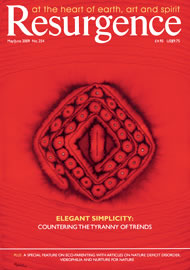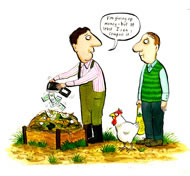IT’S IMPOSSIBLE TO tell how far down a certain path you’ll walk once you’ve taken that vital first step. Ten months ago I decided that I was going to live as oil-free a life as possible. Originally this consisted of me using no plastic, only buying products from local craftspeople, having no bin and eating nothing but local, organic and vegan food.
To begin with people constantly questioned why I was acting so “extreme”, my answer always being that I had just become tired of being a hypocrite. I’d be marching for peace through the streets of London, criticising Mr Bush and Mr Blair, whilst expecting them to keep me supplied with cheap oil through my purchases at the checkout. I was sending them completely conflicting messages. Why should I expect them to care about something I obviously didn’t really care about?
After the initial questioning was over, the realities of the experiment kicked in. On a physical level, I was feeling quite weak during the first month and was struggling to find the energy even to dig my allotment. My body was used to the protein that China’s lentils, Bolivia’s nuts and America’s soya supplied me with. I initially lost about half a stone as I could not find any products with a high fat content, the problem being not that we can’t grow such crops here, but that we’ve sub-contracted our food security to those countries where the labour is cheaper.
On an emotional level I was feeling quite down, and the third week into my ‘no oil’ experiment was probably the lowest I’ve ever been. At the time I had no idea what was causing it as I should have been really happy, given the fact that I was finally living closer to my Truth. But after some research into my symptoms – weakness, unhappiness, poor sleep – I realised that I was lacking in an essential amino acid called tryptophan. Supplements were out of the question (being manufactured using oil), so I hunted down local foods high in this amino acid – mustard greens, foraged hazelnuts, seaweed, broccoli, kale, sprouted rye grain and spinach, to name but a few – and within weeks, I wasn’t just feeling back to normal, I was starting to feel healthier than ever.
What has concerned me, however, is how physically and mentally addicted we have become not just to oil, but to the products of oil. If I was suffering because I could no longer feed my minor addictions to bananas and cashew nuts, then how much more so those who are addicted to cheap tobacco, cheap alcohol, cheap drugs, widely available allopathic medicines, and most of all, the thrill of being able to have whatever you want when you want it? If oil ran out tomorrow, would a society so addicted to oil as ours be able to come up with solutions for its survival?
The discipline this experiment required is doing me good, however. Gandhi once stated that a coward can never be spiritual, and that self-discipline is essential training for bravery. I believe one of the main issues in the world today is self-discipline, or, more precisely, the lack of it. I have friends who tell me that they couldn’t live like this because they couldn’t give up chocolate or soya milk. The reason we have so much destruction, so much hatred, so much apathy and inaction, is because the soldier of peace, the Satyagrahi, has long since stopped being as brave as the soldier of war.
THE TWO MOST difficult parts of the experiment have been the social aspect and the fact everything takes so much time without oil. However, I am convinced that these are only problematic because I am doing it in isolation. If done communally, these issues evaporate almost instantly. Doing this communally is my longer-term vision. I have already begun with plans to get a core group of individuals together to start the first Freeconomy Community. After the initial infrastructure is in place, this community will live without money, and therefore live without oil by default. “Is living oil-free not enough?” I hear you ask. “Why go to the extreme of living completely without money?”
Six months into the experiment I realised that what I was doing was not enough. There should be no disparity between thought and action, head and hand. I am always striving to understand the root causes of the environmental destruction we inflict. We live in such a wasteful culture; and the main reason we are so wasteful is because we have no respect for, and no connection to, the things we consume. Because we don’t have to make what we consume, or even know the person who made it, we have no appreciation for the embodied energy that goes into it. The tool that allows this disconnection to happen is money, a tool that also allows us to bank exploitation for a rainy day, and a tool that has replaced friendships and community as the primary source of our sense of security.
If we had to grow all our own food, we wouldn’t waste a third of it as we do now. If we had to make our own tables, we wouldn’t throw them out the moment we changed the interior décor. If we had to clean our own drinking water, we sure as hell wouldn’t foul it.
Given this realisation, I have no choice but to let my experiment take a rapid evolution, and so not only have I taken anything containing petroleum-based products out of my diet, I’ve also now taken money out of my life! Have I gone too far? I hope so, for unless one pushes the boundaries of sustainable living, how will we know how far we truly need to go? And as the Mahatma also once said, “the difference between what we do and what we could do would be enough to solve most of the world’s ills.” I look forward to updating you on my year without money, the logical next step to my year without oil.
Mark Boyle is founder of The Freeconomy Community. www.justfortheloveofit.org








